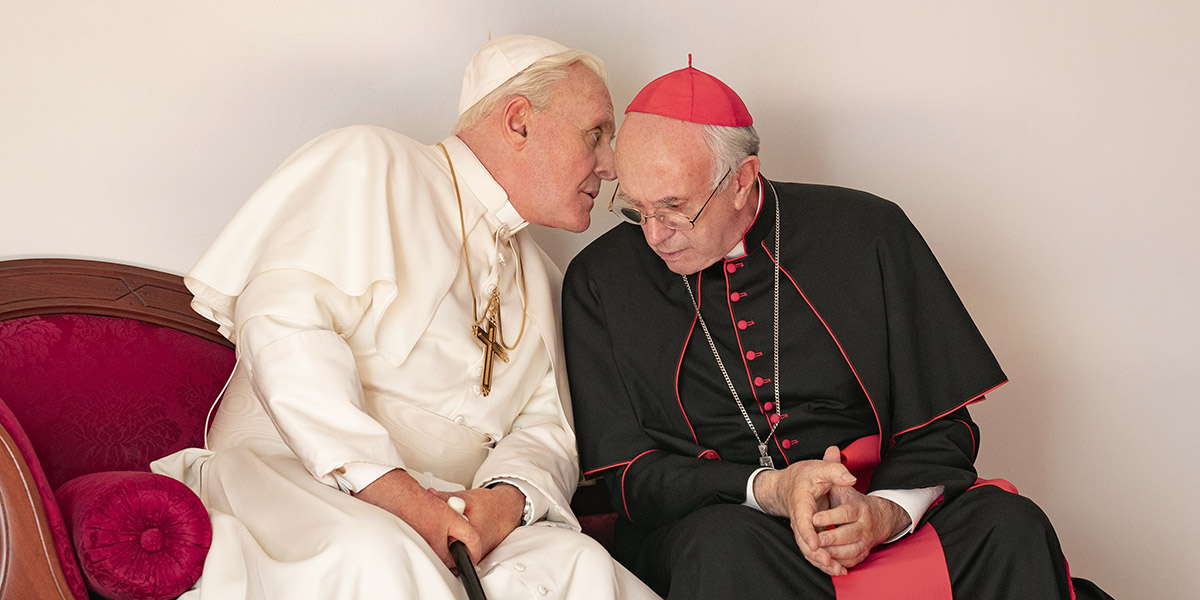TELLURIDE – Is change also compromise? Can there be compromise without change? Are these actions tied to one another or are they completely different philosophical constructs? That debate is the underlying theme of Fernando Meirelles’ “The Two Popes,” which screened at the 2019 Telluride Film Festival the past weekend after debuting at the Venice Film Festival late last week. And, surprise, there is no easy answer.
READ MORE: Matt Damon And Christian Bale Thrill in ‘Ford v. Ferrari’ [Review]
On the surface, “The Two Popes” seems to be just that. A film about the unprecedented transfer of power between Pope Benedict XVI (Anthony Hopkins) and Cardinal Jorge Mario Bergoglio, later Pope Francis (Jonathan Pryce), in 2013. In actuality, it mostly tells the story of the Argentinian Bergoglio and how he rose from a Jesuit Priest to Archbishop to the most “progressive” Pope that anyone can remember (although his not-so-positive stance on gay marriage and other issues seems to have been forgotten this time around).
READ MORE: Our 9 Most-Anticipated Films Of The 2019 Telluride Film Festival
Bergoglio’s tale unfolds during a visit to the Vatican where he is following up with Benedict XVI on his earlier request to resign as Archbishop. A resignation that he discovers Benedict XVI has no intention of endorsing. But first Meirelles and screenwriter Anthony McCarten have some backstory that needs to be revisited.
For those not versed in the politics or history of the Catholic Church, Benedict XVI’s birth name is Joseph Ratzinger. He was a German priest who eventually became an influential and conservative Archbishop based in Rome. His potential ascendency found him at odds with a number of reformer candidates for the papacy including Bergoglio. When Ratzinger was eventually selected by his peers it was seen as a rebuke of those attempting to bring the church into the 21st Century (or the 20th Century for that matter). History has shown us that when Benedict XVI resigned a little under eight years into his term, the College of the Cardinals (the world’s Archbishops), went in a decidedly different direction with Bergoglio. What history has not documented is this little-known meeting between the two which is the basis for the film.
Granted, whether this meeting actually occurred or not is unclear (if someone can find documentation please forward it), but the conversations in the film are all highly speculative so that question is therefore moot anyway. All that is known about the relationship between the two men is that before he was anointed Benedict wasn’t a fan of Bergoglio and after Bergoglio became the new Pope the men’s relationship became much more cordial. Meirelles and McCarten use these two days during Bergoglioa’s visit as a framework to explain this turnaround while having both men vent to each other about their philosophical differences. Has Benedict “changed” by seeing the necessity for Bergoglio in the Church or is he compromising because of pressure inside the church? Has Bergoglio truly changed following his inaction during the Argentinian military coup in the ‘70s that derailed his career? Can either truly change? Can either really compromise? And, yes, the debate will be viewed by many audiences as a snapshot of the seemingly widening gap between conservatives and liberals in this era of Trump.
Luckily, this dialogue does not turn the movie into a theatrical conversation that would be more suited for the stage. That’s because of Meirelles’ brisk direction and the fact Bergoglio’s life is revisited in extensive flashbacks (where he’s played by the talented Juan Minujín) to break up the discourse. This focus on Bergoglio’s sins during a dark moment in Argentinian history may make some of his new fans around the world look at him in a different light. But, for the most part, Meirelles and McCarten have no intention of throwing either Pope under the bus. In fact, they may have been a bit too kind to their subjects.
Francis’ ascendency is obviously depicted as a breakthrough moment for Catholicism and that’s partially because of Pryce’s inherently joyful portrayal of Francis. The current Pope is known for being a champion of the poor and decidedly no-frills (McCarten has great fun including a bit about Francis trying to make his own travel arrangements). Pryce also plays him as gregarious and down to earth as a Pope can get. Whether or not you truly love Pope Francis it’s difficult not to become enamored with Pryce’s version of him. Even a hardcore atheist would want to grab a drink with this guy. Hopkins, on the other hand, constructs a version of Benedict that is just compassionate enough that it might surprise even some of his staunchest supporters. Benedict’s detractors often referred to him as a Nazi for a number of reasons (something casually noted in the film), but he comes off surprisingly well in this depiction.
You might not expect Meirelles’ usual aesthetic (“City of God,” “The Constant Gardener”) to mesh with McCarten’s prestige meets studio narrative style (“Bohemian Rhapsody,” “The Theory of Everything”) and, frankly, it doesn’t always work. There are certainly moments when you wish the former would have ditched some of the screenwriter’s familiar biopic tropes for the more intimate filmmaking he’s known for, but overall “The Two Popes” is so entertaining you easily forgive these broad indulgences. Moreover, the dialogue gives Pryce and Hopkins so much material to chew on their expert bantering almost transforms high art.
Somehow the filmmakers found lightheartedness and – gasp – laughs in a story of political intrigue at the top of the notoriously buttoned-up Catholic Church. Levity during a moment in history that foreshadows the current crisis the modern world finds itself in. Clearly, miracles, even cinematic ones, never cease. [B+]
Follow along with all our 2019 Telluride Film Festival coverage here.





